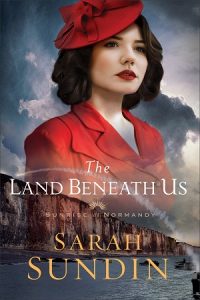The author talks about how the theme of her latest novel intruded on her own life.
Sarah Sundin is the bestselling author of several popular WWII series, including Waves of Freedom, Wings of the Nightingale, and Wings of Glory. Her novels Through Waters Deep and When Tides Turn were both named on Booklist’s “101 Best Romance Novels of the Last 10 Years.”
Sarah continues her Sunrise at Normandy series with the third book, The Land Beneath Us (Revell). Set during WWII, Private Clay Paxton has only one thing to live for—fulfilling the recurring dream of his death. After he saves librarian Leah Jones’ life from a brutal attack, he saves her virtue with a marriage of convenience. When he ships out, can a love strong enough to overcome death grow between them before Clay’s recurring dream comes true?
In this interview, the author walks us through the benefits of writing romances from a biblical worldview, shares some examples of how her faith impacts her storytelling, and reveals where she draws the line between history and fiction.
Sarah, tell us about Private Clay Paxton and librarian Leah Jones. What about these characters made you want to build a story around them?
Clay is training as an Army Ranger, hoping to do his best in the upcoming invasion of France. With his future stolen by his brothers’ betrayal, Clay feels he has nothing to live for—except dying for his country. Leah is fresh out of high school, fresh out of the orphanage where she was raised, and she’s longing to make her own way in the world as a librarian.
I was drawn to write their stories because of each character’s deep sense of loss and their innate strength.
What inspired you to set The Land Beneath Us in this time and place?
 Ever since I visited Pointe du Hoc in Normandy, I’ve wanted to tell the story of the Rangers who scaled the cliffs on D-day. The Rangers trained at Camp Forrest in Tullahoma, Tennessee, a small town that exploded due to this training camp. Many civilians worked at Camp Forrest, so I gave my Leah a job in the camp library.
Ever since I visited Pointe du Hoc in Normandy, I’ve wanted to tell the story of the Rangers who scaled the cliffs on D-day. The Rangers trained at Camp Forrest in Tullahoma, Tennessee, a small town that exploded due to this training camp. Many civilians worked at Camp Forrest, so I gave my Leah a job in the camp library.
How does The Land Beneath Us fit into the bigger picture of your Sunrise at Normandy series?
This is the final book in the series, which has followed three estranged brothers who fight on D-day from the sea, in the air, and on the ground. Clay, the youngest brother, has been seriously wronged by both brothers, so I was able to explore the concept of how do you forgive the unforgiveable? And is reconciliation possible—or even desirable?
How did you research the period where and when your fiction takes place?
For Clay’s story, I read a lot of books and documents about the 2nd Ranger Battalion as well as about the bigger story of D-day. For Leah’s story, I researched libraries and books in World War II and orphanages during the Depression.
I was also blessed to take research trips to England, Normandy, and Tullahoma to get a feel for each place. My favorite thing was meeting a woman in one of Tullahoma’s leading families—and she told me so many stories and showed me wonderful pictures.
Where do you draw the line between being historically accurate and taking license for the sake of the story?
I rarely bend history. I don’t find the need to, since history provides so much material for me to work with. Since I use fictional characters, I have to insert them into a real world, which sometimes means “shoving aside” real people to make room for my characters.
For example, I knew the name of the real head librarian at Camp Forrest, but I needed Leah’s boss to have some negative qualities, something I didn’t feel comfortable doing to this real-life woman. So, I created a fictional head librarian.
Likewise, all the men in Clay’s company are fictional. For their stories, I modified and adapted stories of the real-life Rangers, using my imagination to create their backgrounds and personalities.
What are the challenges (or benefits) of writing “romances” from a biblical worldview?
From my point of view, it’s all benefit! I love being able to develop a romance that grows from shared interests, friendship, a mutual cause, and faith. Physical attraction is a part of it, of course, but not as important as character. This provides a more realistic model.
When young ladies email me about how they want to meet a man like Clay, it isn’t because he’s good-looking, but because he’s kind and strong and generous—and he isn’t perfect!
Another benefit to romance with a biblical worldview is having each character help the other grow spiritually. Clay and Leah teach each other lessons about forgiveness and belonging, not neat little lessons, but lessons learned the hard way.
What do you hope readers take away after reading The Land Beneath Us?
I do hope readers will see the importance of forgiveness and even spot areas of unforgiveness in their lives—I know I did! I also hope readers will come to sense their true belonging in Christ.
Can you share some examples of how your faith impacts your storytelling?
Wouldn’t you know the Lord gave me something “big” to forgive while writing this book. Something I didn’t want to forgive, and many people would say I didn’t have to forgive. So, like Clay I had to work through it.
Why is storytelling such a powerful way to communicate truth?
 Jesus could have simply said, “God will forgive you, no matter what you’ve done.” Instead he told the story of the Prodigal Son. God wired our brains to relate to story. As a Bible study teacher, I’ve taught lessons on forgiveness. I know which verses to cite.
Jesus could have simply said, “God will forgive you, no matter what you’ve done.” Instead he told the story of the Prodigal Son. God wired our brains to relate to story. As a Bible study teacher, I’ve taught lessons on forgiveness. I know which verses to cite.
But walking through the process of forgiveness with Clay felt real and raw to me. It was messy. It was painful. He thought he’d done the hard work of forgiving, then something new would pop up and spark resentment all over again. Readers have told me it was a powerful experience for them, and that means a lot to me.
What are the best things readers can do to support their favorite authors?
Buy books. Give books. Write reviews online. Tell people about the books you love, both in person and on social media. And please, pray for your favorite authors—we need that most of all.
Visit Sarah Sundin’s Author Page:
https://www.familyfiction.com/authors/sarah-sundin/

The Land Beneath Us
Sunrise at Normandy #3
Sarah Sundin
Revell
Buy the book from our store!
In 1943, Private Clay Paxton trains hard with the US Army Rangers at Camp Forrest, Tennessee, determined to do his best in the upcoming Allied invasion of France. With his future stolen by his brothers’ betrayal, Clay has only one thing to live for–fulfilling the recurring dream of his death.
Leah Jones works as a librarian at Camp Forrest, longing to rise above her orphanage upbringing and belong to the community, even as she uses her spare time to search for her real family–the baby sisters she was separated from so long ago.
After Clay saves Leah’s life from a brutal attack, he saves her virtue with a marriage of convenience. When he ships out to train in England for D-day, their letters bind them together over the distance. But can a love strong enough to overcome death grow between them before Clay’s recurring dream comes true?


